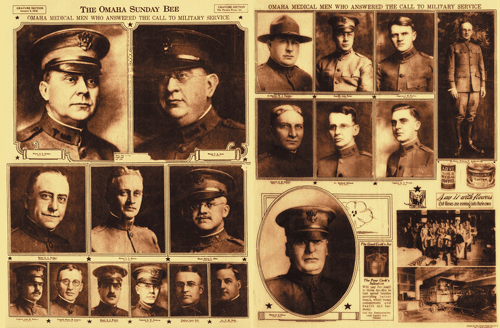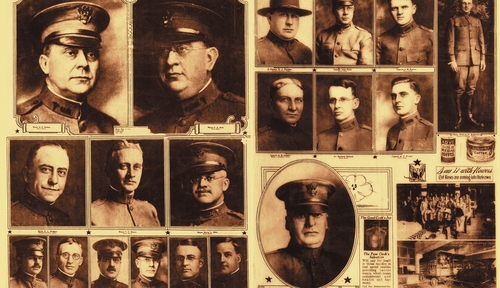 |
The Omaha medical men who answered the call to military service are featured in the Omaha Sunday Bee in January 1919. |
Standards, of course, declined as they did in all other schools in the country. Student interest reached a low ebb and the members of the faculty who remained at home were worked to exhaustion and only did the minimum of essential teaching while military events filled everyone’s minds.
By March 1918, 80 members of the College of Medicine faculty and student body were in the service. Dr. Arthur Stokes served as director of the University of Nebraska Base Hospital No. 49, as well as chief of surgical service. Dr. Edson Bridges served as chief of medical service, and other physicians in the unit included Charles Hull, John Potts, James Patton and John Nilsson. The volunteering of Drs. Harold Eggers, LeRoy Crummer, William Anderson, John Lord, Clyde Moore, Robert Schrock, Adolph Lindquest and Edwin Davis further reduced faculty numbers.
Base Hospital No. 49 was:
- Organized in September 1917,
- Mobilized in March 1918, and
- Transferred to Fort Des Moines, Iowa, for training.
The unit sailed for England in July 1918, and landed in Cherbourg, France in August 1918, later moving on to Allerey, France. The 1,000-bed hospital had an emergency expansion of 1,000, which was nearly tested on Nov. 10, 1918 (one day before the armistice ending the war was signed), when 1,950 patients were hospitalized.
The hospital unit ceased to function in January 1919, and the members of the unit sailed for New York in April 1919. In May of that year, the unit transferred by train to Camp Dodge, Iowa, where it was demobilized on May 7, 1919.
Even with limited faculty, the College of Medicine continued with an accelerated course of study to insure a continual supply of medical school graduates for what was foreseen as a long and bloody war. In October 1918, Dr. Cutter himself entered the service as a captain, having been granted leave of absence by the Board of Regents. The early end of the war brought him back in 1919 to reclaim his position from Acting Dean Poynter.
